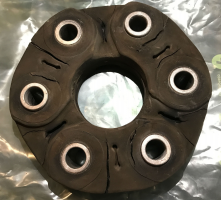
— A Ford Transit van driveshaft flexible coupling lawsuit alleges 2015-2017 Ford Transit vans have driveshaft flexible couplings, also known as flex discs, that crack and fail and cause serious dangers and a huge expense to repair.
The driveshaft flexible coupling (pictured right) is a type of joint that connects the transmission to the driveshaft. The failure of the driveshaft flexible coupling can cause the driveshaft to rip away from the transmission, causing severe damage to surrounding components.
Those components include brake and fuel lines, the transmission, rear end differential, torque converter and evaporation container.
The vans are popular with business owners who depend on the vehicles for their livelihoods, and it is business owners who filed the class-action lawsuit.
The problems allegedly experienced by the plaintiff (All Care Transport) reads like the script of a soap opera.
According to the lawsuit, the plaintiff bought a new 2015 Ford Transit van in May 2015 and in November 2016, the driver heard a loud popping noise and felt a vibration while driving on the freeway. The driver allegedly lost steering and braking because the flex disc failed, causing the driveshaft to separate from the engine.
The failure of the flex disc was so violent that it also sheared the brake lines and coolant lines, damaged the fuel line and evaporation canister and broke the transmission mount bracket and flange, all of which had to be replaced and repaired.
The van was taken to a dealer where it was out of service for almost a month while being repaired, causing a repair bill of $3,204.03.
All Care Transport also bought a new 2016 Ford Transit van in September 2015, but in November the van was taken back to the dealer because the vehicle was vibrating. Technicians inspected the flex disc and found the driveline coupler was coming apart, causing the van to spend two weeks in the shop.
On June 5, 2017, All Care Transport brought the same van to a dealership because the catalytic converter allegedly failed, so the plaintiff asked technicians to check on the flex disc. The service tech found the flex disc (which had been installed new only six months and 47,335 miles earlier) was cracked, so they replaced it with a new driveshaft flexible coupling at a cost of $267.11 to All Care Transport.
Then there is a third Transit van the plaintiff purchased new in December 2015. After the first van experienced catastrophic flex disc failure and the second van had a cracked flex disc, All Care Transport brought their other vans to a dealer to have the flex discs checked.
On December 8, 2016, the service center found the driveshaft flexible coupling in the third van was cracked and coming apart, so the flex disc was replaced.
On May 13, 2017, as the third Transit van was being accelerated on a freeway entrance ramp, the driver felt a hard vibration and heard a loud popping noise and pulled over to the side of the on-ramp.
The van was towed at a cost of $160 and technicians found the flex disc (which had just been installed new five months earlier) had catastrophically failed, causing the driveshaft to drop off the engine and tear into pieces, shearing the transmission off its mount, shredding the fuel lines, damaging the evaporator box and lines and the heater hose.
The plaintiff says when the driveshaft separated from the engine, it nearly tore through its catch-loop, something that would have caused the Transit to pole-vault down the highway.
It allegedly took more than five weeks for the dealer to repair the van, at a cost of $5,211.
But then there is a fourth Transit van that was purchased new in May 2016. The plaintiff had the van at a shop in April 2017 and asked workers to check the flex disc. They allegedly found the disc was cracked and had to replace it at a cost of $356.11 to All Care Transport.
The lawsuit alleges when Ford Transit owners complain to the automaker about the driveshaft problems, Ford allegedly denies knowledge of the problems and makes owners pay for repairs. However, the plaintiff says Ford has known about the driveshaft flexible coupling problem since 2014 and finally ordered a recall in June 2017.
The recall notice says “continuing to operate a vehicle with a cracked flexible coupling may cause separation of the driveshaft, resulting in a loss of motive power while driving or unintended vehicle movement in park without the parking brake applied.”
In addition, Ford told Transit owners that “separation of the driveshaft from the transmission can result in secondary damage to surrounding components, including brake and fuel lines.” Ford also acknowledged that “driveshaft separation may increase the risk of injury or crash.”
In its recall notice, Ford requires Transit owners to replace the driveshaft flexible coupling “every 30,000 miles” until a permanent remedy (which Ford does not have) becomes available. The plaintiff says Ford not only doesn't have a fix for the problem, but nothing in the documents indicates that Ford will reimburse owners who have paid to have the flex discs repaired.
Currently the proposed class-action lawsuit includes 2015-2017 Ford Transit owners and lessees in California only, but lawsuits such as this often begin in localized areas and then expand to other parts of the country.
The Ford Transit van driveshaft flexible coupling lawsuit was filed in the U.S. District Court for the Central District of California, Eastern Division - All Care Transport, LLC, et. al., v. Ford Motor Company.
The plaintiff is represented by Lieff Cabraser Heimann & Bernstein LLP, Jones Ward, and Glancy Prongay & Murray LLP.




